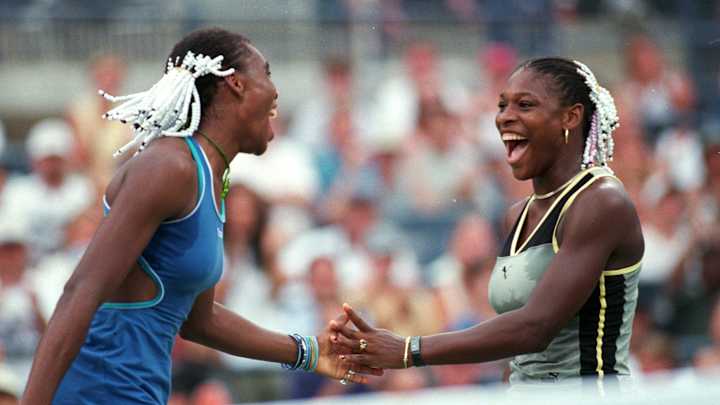The Most Remarkable Story in Sports: Venus and Serena to Meet Again at U.S. Open

“This is our first Grand Slam final together, and, really, that’s the way we’d like it to be. Because then both of us win in a way. [But] I just hate to see Serena lose any way, even against me.” — Venus Williams, following the 2001 U.S. Open final.
“She said she didn’t feel like she really won because she always wanted to you, you know, kind of protect me. I told her, ‘Well, you won. Take it. You know, it’s your win. It’s your victory.” — Serena Williams, following the 2001 U.S. Open final.
• From the Vault: S.L. Price on the 2001 U.S. Open final between Serena and Venus Williams
We can measure this phenomenon in years: 1998 to the present. But we can also measure it by fashion benchmarks: beads, braids, boots, catsuits, and, yes, tutus. There are circumstances and milestones to use as markers: returns from injuries, from Sjögren's syndrome, from family tragedy, family joy, and now, the P.O. Post-Olympia Era, that is.
The first meeting between these two icons came during the Bill Clinton administration (the winner, then a giddy 20-year-old, took a call from the sitting President, accepted his congratulations and then complained about her tax rate.) When they met in 2015, Donald Trump, fresh off a presidential debate, was in the stands.
And now the Most Remarkable Story in Sports continues. Friday night, the U.S. Open will host Williams Bowl XXX, the 30th (!) match between Venus and Serena Williams. In some ways, so strikingly much has changed. They are now 38 and 36 years old, respectively. Grand dames of tennis.
In other ways, so strikingly little has changed. The first time Venus and Serena played each other, it was a curiosity, an occasion to observe an unlikely intra-family feat. But it was a fraught affair, played before a crowd entirely unsure how to behave. Is it weird to cheer for one sister at the expense of the other? I’m still not sure we’ve reached a consensus here.
But if there’s still ambivalence about whether you root for one sister over another, there’s complete agreement here: root for them both. The Williams-Williams encounters are less tennis matches than they are occasions to celebrate a family.
Watch: Serena Williams's Return to US Open Celebrated in New Nike Ad
When Serena and Venus played here in 2015, it drew a full house and a celebrity cohort to rival the Oscars. Oprah, Justin Timberlake, assorted Jenners and Kardashii were there; as were tennis royalty, from John McEnroe to Martina Navratilova. As always, it was a psychologically fraught affair. So much so that neither of their parents attended, while their two other sisters, Isha and Lyndrea, sat together on a couch in the players’ lounge with their backs to the television. The final score (6-2, 1-6, 6-3 for Serena) didn't much matter. The applause lingered, in part to acknowledge the story, in part because who knew if we’d ever again see Williams sisters on opposite sides of the court ever again.
But as they’ve done their entire career, they have outserved conventional wisdom. Of course they would continue. Since that 2015 New York coronation, they’ve both been in top 10, showing few signs of capitulating to age or tennis timelines. Serena has added to her haul of Grand Slams. They’ve played in a major final (Serena won that one, at Melbourne 2017) and played in Indian Wells earlier this year (Venus this time.)
They’ll take the court here Friday. It will mark Serena’s 103rd U.S. Open singles match and Venus’s 95th. Awkwardness and all, they’ll each want to win, of course.
And to the rest of the world, they each already have.

Jon Wertheim is a senior writer for Sports Illustrated and has been part of the full-time SI writing staff since 1997, largely focusing on the tennis beat , sports business and social issues, and enterprise journalism. In addition to his work at SI, he is a correspondent for "60 Minutes" and a commentator for The Tennis Channel. He has authored 11 books and has been honored with two Emmys, numerous writing and investigative journalism awards, and the Eugene Scott Award from the International Tennis Hall of Fame. Wertheim is a longtime member of the New York Bar Association (retired), the International Tennis Writers Association and the Writers Guild of America. He has a bachelor's in history from Yale University and received a law degree from the University of Pennsylvania. He resides in New York City with his wife, who is a divorce mediator and adjunct law professor. They have two children.
Follow jon_wertheim